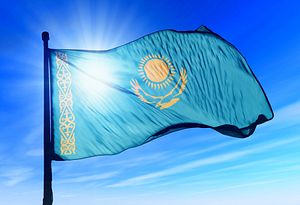This week the Kazakh Defense Ministry announced that it had reached an agreement with Israel to jointly manufacture unmanned aerial vehicles (UAVs). The agreement, Haaretz reported, came after the Kazakh defense minister, Imangali Tasmagambetov, met with his Israeli counterpart, Avigdor Lieberman, in Tel Aviv.
The Kazakh Defense Ministry said in a statement that the two ministers reached an agreement to jointly produce drones using Israeli technology in Kazakhstan. The Israelis will also train Kazakhs in drone operations.
Lieberman hailed Israeli-Kazakh ties as historic and complimented Astana on its grand-scale tolerance, “where all religions and nationalities exist peacefully.” He also threw in a compliment for Nazarbayev, saying the state of harmony was all thanks to the president.
As Samuel Ramani noted in The Diplomat earlier this summer, relations between Kazakhstan and Israel have continued to deepen in recent years. “Kazakhstan is a vital oil supplier to Israel and Israel has contributed greatly to Kazakhstan’s economic diversification efforts,” Ramani wrote. “Israel’s provisions of military technology and counterterrorism assistance to Kazakhstan have resulted in Kazakhstan becoming one of Israel’s closest security partners in the Muslim world.”
“Security is the main condition of effective development of any country. It is natural that we are keen on development of our relations with your country in defense-related issues,” Tasmagambetov told Lieberman.
Haaretz noted that the Israeli Defense Ministry hasn’t provided details about the deal. “Usually, the Defense Ministry reports on official working meetings with defense officials from other countries, but this time it reported nothing. The ministry’s spokesperson’s office refused to comment on the visit or the announcement.”
Details regarding specifically what kinds of drones or when production would begin are scarce. FlightGlobal noted that Kazakhstan seems most interested in medium-altitude, long-endurance platforms like the Heron 1 and the Hermes 450. It’s possible initial deliveries would come directly from Israel, with production in Kazakhstan starting later.
According to the New America Foundation’s drones database, using information from the Stockholm International Peace Research Institute, between 2001 and 2011 Israel was the world’s largest drone exporter, accounting for 41 percent of all drones exported in that timeframe. The database notes that Kazakhstan only presently has Tier I–low altitude, low endurance–drones. In 2008 Kazakhstan imported Orbiter drones from Israel and there were also reports that the country imported Irkut drones from Russia. In 2010 Kazakhstan signed a deal with France’s Sagem to jointly produce drones but little has been said since.
The recently reported drone deal with Israel nearly fits into the trend of deepening relations, as does Israeli Prime Minister Benjamin Netanyahu’s planned visit to Kazakhstan later this year. The visit, scheduled to take place in mid-December, will be the first visit of a sitting Israeli prime minister to Kazakhstan. In 2009, Israeli President Shimon Peres was the first Israeli head of state to visit Astana. The two countries officially established relations in 1992.
One Israeli government official “characterized Netanyahu’s upcoming trip to Kazakhstan as ‘historic,'” in a comment to the Jerusalem Post.
Other unnamed officials had doubts about the drone deal. In particular, there are concerns that technology shared with Kazakhstan could leak to the Russians. “There are certain state-of-the art systems that Israel does not sell to the Russians, the officials explained, and it would be difficult to then turn around and sell the same systems to Kazakhstan,” the Jerusalem Post said.
Further, some officials commented that in international forums Kazakhstan often votes against Israel. Kazakhstan, as a Muslim-majority nation, at times aligns itself internationally with the Organization of Islamic Cooperation; as a former Soviet country, Kazakhstan also often aligns with Russia.
For example, in November 2015 Kazakhstan’s ambassador to the United Nations, Kairat Abdrakhmanov, spoke during the annual debate about Palestine and the Middle East. Abdrakhmanov “expressed serious concern over continuing violations in the Occupied Palestinian Territory and in the entire region.” He condemned both the then-recent rocket attacks by Hamas as well as the “disproportionate use of force by Israel.” Kazakhstan went on to support a raft of resolutions regarding the Middle East that put it with the bulk of countries but squarely opposite Israel.
Kazakhstan also has fairly steady relations with Iran, but stridently pushes for nonproliferation around the world. It has worked toward that end with regard to Tehran.
Amid this mix of contrasting interests, Astana nonetheless sees ties with Israel as very important: Israel is a hub of technology innovation and business development that Kazakhstan hopes will expand into the steppe.
Astana has worked to position itself as a key international player, and relations with Israel are an important facet of its multivector politics. Kazakhstan has tried its hand at mediating the Syrian crisis (unsuccessfully) as well as the recently ended crisis in Russian-Turkish relations (successfully). Among Kazakhstan’s many interests, becoming a top 30 economy and key international player are at the top. In both endeavors, strengthening relations with Israel is beneficial.

































